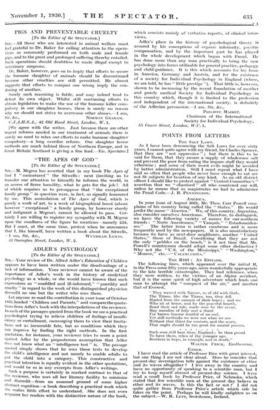ADLER'S PSYCHOLOGY
[To the Editor of the SPECTATOR.] Sia,—Your review of Dr. Alfred Adler's Education of Children appears to have been written under the disadvantage of a lack of information. Your reviewer cannot be aware of the importance of Adler's work in the history of analytical psychology as a whole, or she would have known that such expressions as "muddled and ill-informed," "puerility and cruelty " in regard to the work of this distinguished physician discredit no one but the writer who uses them.
Let anyone re-read the contribution in your issue of October 18th, headed "Children and Parents," and compare the quota- lions from Adler's book with the interpolations of the reviewer. In each of the passages quoted from the book we see a practical psychologist trying to relieve children of feelings of insuffi- ciency or curtailment, encouraging them to view their limita- tions not as inexorable fate, but as conditions which they can improve by finding the right methods. In the first quotation, for instance, your reviewer tries to score a point against Adler by the preposterous assumption that Adler does not know what an " intelligence test " is. The passage quoted simply shows that he uses these tests to develop the child's intelligence and not merely to enable adults to put the child into a category. This constructive and practical intention is equally evident in the other quotations, and would be so in any excerpts from Adler's writings.
Such a purpose is certainly in marked contrast to that of the reviewer, who uses all her literary facility to minimize and discredit--from an assumed ground of some higher abstract cognition—a book describing a practical work which she makes little effort to understand. She does not even acquaint her readers with the distinctive nature of the book, which consists mainly of verbatim reports, of clinical inter- views.
Adler's place in the history of psychological theory ii assured by his conceptions of organic inferiority, psychic compensation, and by the important part lie has played in the whole development which began with Freud. He has done more than any man practically to bring the new psychology into forms utilizable for general practice, pedagogy and child-guidance. It is this which accounts for his fame in America, Germany and Austria, and for the existence of a society for Individual Psychology in England (where, we are told, he has " little prestige "). That little is, however, shown to be increasing by the recent foundation of another and purely medical Society for Individual Psychology in this country which, though it is limited to the profession and independent of the international society, is definitely of the Adlerian persuasion.—I am, Sir, &c.,
PHILIPPE MAIRET, Chairman of the International
Society for Individual Psychology. 55 Gower Street, London, W.C.1.










































 Previous page
Previous page